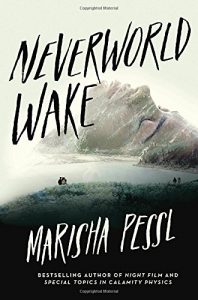 Summary: Once upon a time, Beatrice and her five best friends were the cool kids, the beautiful ones. Then the shocking death of Jim changed everything. One year after graduation, Beatrice is returning to Wincroft hoping she’ll get to the bottom of Jim’s death. But as the night plays out in a haze of stilted jokes and awkward silence, Beatrice senses she’s never going to know what really happened. Then a mysterious man knocks on the door and announces the impossible: time for them has become stuck, snagged on a splinter that can only be removed if the former friends make the harshest of decisions. Now Beatrice has one last shot at answers . . . and at life. And so begins the Neverworld Wake.
Summary: Once upon a time, Beatrice and her five best friends were the cool kids, the beautiful ones. Then the shocking death of Jim changed everything. One year after graduation, Beatrice is returning to Wincroft hoping she’ll get to the bottom of Jim’s death. But as the night plays out in a haze of stilted jokes and awkward silence, Beatrice senses she’s never going to know what really happened. Then a mysterious man knocks on the door and announces the impossible: time for them has become stuck, snagged on a splinter that can only be removed if the former friends make the harshest of decisions. Now Beatrice has one last shot at answers . . . and at life. And so begins the Neverworld Wake.
The Prestige is one of my favorite, favorite films: a knot of a cipher that explicitly asks its audience to pay attention. Are you watching closely? a character asks. Because here are all the answers. But no one does the first time around; whether it’s the magic of the movies or the pull of a story, we want to be deceived. It’s only looking back that we see all the clues laid bare. (Please go watch this film, y’all; it is so, so good.) For me, the beauty of Marisha Pessl’s latest, Neverworld Wake, is not the driving force of its protagonist, Beatrice, who wants to figure out what really happened to her late boyfriend, Jim. And it isn’t found in the novel’s core plot, either, when the main characters do everything (and then do it twice) to decipher and beat the Neverworld. It’s folded around the monotony of repetition. When faced with only hours and also eternity, how do individuals occupy their time? Whom or what do they prioritize? It’s tucked into memory and choice and the things we tell ourselves after the fact. What makes something real? Is it the act? What about the feeling of the act? Or the memory of the feeling of the act? Or the memory of the memory of the feeling of the act?
When Pessl finally explains what happened to Jim, it almost doesn’t even matter anymore. Both we and her characters have gone through so much that the act of uncovering has become more insightful than what we were waiting to uncover. In such a short book, she manages to beautifully flip everything around, recenter reality to explain how we weren’t watching closely at all. We wanted to be fooled and so we were. Neverworld Wake is so good at hiding things in plain sight that I want to read it again just to figure out how much I missed.


